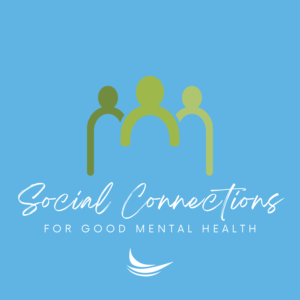 Here are 6 Tips from the Suicide Awareness Voices of Education to Help Get Connected.
Here are 6 Tips from the Suicide Awareness Voices of Education to Help Get Connected.
- Make Plans with a Friend and Keep Them
- Prioritize Family Time
- Find a Mentor or Become One
- Get Involved with New Hobbies or Reconnect with Old Hobbies
- Give Back to Your Community
- Practice Self Care
Friends and family are some of our most important sources of social connection. While social media is a quick and easy option, meeting in person whenever possible is recommended. In-person meeting gives the opportunity to better read social cues, pick up on nonverbal communication, and have physical contact. Knowing that a friend or family member is there to listen and support, especially during times of emotional crisis can help save lives. Take time to prioritize these relationships.
Mentoring is a great way to connect with a positive role model, which is mutually beneficial to both the mentor and mentee. Check out some of the following mentoring options focused on youth, professional career development, and mental health.
Youth Mentors:
https://www.bigstwincities.org/
https://www.bolderoptions.org/
https://www.queerspacecollective.org/
Business Mentors:
https://twincities.score.org/content/find-mentor-220
https://www.mplsmadwomen.org/about
Mental Health Mentors:
https://save.org/get-involved/volunteer/
Mentoring is just one example of many ways to get involved in your community, give back in a meaningful way, and to connect with others who have similar values and passion. One way that CARE gives back is through Care More MN by removing barriers for BIPOC students pursuing graduate psychology degrees. There are many different opportunities to get involved.
Volunteer Options:
https://www.handsontwincities.org/volunteers
https://www.volunteermatch.org/
Getting involved with hobbies, especially activities that can be done with others is also a great way to increase life satisfaction while having a good outlet to let go of stress and have some fun.
Finally, being available for yourself as part of self-care is way to connect with yourself. Some examples of self-care including taking care of your mind and body by having a healthy foundation of eating, sleeping, and physical exercise. Mindfulness meditation can be a great practice to focus on the present. Evaluating what you want for yourself, setting goals to achieve things that are important, and engaging in activities that bring you joy also lead to increased satisfaction. Being able to be vulnerable and reach out for help is an important reminder. We all need help at times, and seeking help is an act of courage. We CARE about you and your mental health. During times of crisis, call 988 or text SAVE to 741741.
We’re Here to help
Our wellness experts will be happy to take care of you. You can CLICK HERE to schedule an appointment now or call (612)223-8898.
Meet Clinicians
We’re united by our commitment to providing effective, relevant, and innovative mental health support at all stages of your journey. Click Here to find a therapist or find out more about who we are, where we come from, and how we live out CARE’s mission every day.
The professionals at CARE are actively collecting and creating resources to help with what you need and address frequently asked questions. We’re Here for You.


